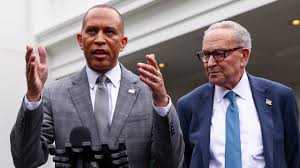The ongoing government shutdown in the United States has the potential to impact millions of Americans who rely on federal food benefits, particularly those enrolled in the Supplemental Nutrition Assistance Program cSNAPc. The shutdown threatens to disrupt the distribution of vital nutrition aid, with funds expected to run dry by November 1, according to a memo from the U.S. Department of Agriculture cUSDAc obtained by Fox News Digital.
Approximately 42 million people across the country depend on SNAP benefits to access essential food supplies. The situation has prompted alarm among state officials, with more than two dozen states warning residents about potential disruptions in funding. In response to the looming crisis, Virginia Governor Glenn Youngkin declared a state of emergency concerning SNAP benefits.
Rev. Eugene Cho, the president and CEO of Bread for the World, a nonprofit hunger advocacy organization, highlighted the far-reaching consequences of the funding shortfall. Cho emphasized that the absence of funding for SNAP would not only affect certain individuals but would have widespread impacts nationwide. The intricate administration of SNAP benefits through local states adds a layer of complexity to how the reduction or elimination of benefits is communicated and implemented across different regions.
Furthermore, the prolonged shutdown also threatens the availability of resources for the Women, Infants and Children cWICc nutrition program, which serves nearly 7 million vulnerable pregnant women and young children. The potential disruption in WIC services underscores the broad ramifications of the funding crisis on essential nutrition programs that support vulnerable populations.
The political deadlock surrounding the shutdown has put pressure on Democrats to reach a resolution with Republicans regarding federal funding. Democrats have been steadfast in their demand for significant concessions on healthcare before agreeing to support the Republican funding plan. The stalemate has led to significant challenges in passing crucial legislation to address the funding gap.
The passage of a seven-week funding extension by the House, primarily along partisan lines, aimed to provide lawmakers with more time to negotiate a longer-term funding agreement. However, the Senate has faced obstacles in advancing the legislation due to the need for additional Democratic support to break a filibuster.
Democrats have insisted on tying any spending plan to the extension of enhanced Obamacare subsidies set to expire at the end of the year. Additionally, they have called for the repeal of Medicaid cuts enacted under the Republican-sponsored One Big, Beautiful Bill Act cOBBBAc.
The looming threat of SNAP benefits running dry has escalated tensions, with Republicans accusing Democrats of prioritizing political posturing over the wellbeing of American families. House Agriculture Committee Chair Glenn Thompson underscored the urgency of reopening the government to ensure families have access to essential food supplies.
The potential repercussions of federal food benefits drying up present a challenging dilemma for Democrats, given their previous opposition to Republican efforts to expand SNAP work requirements. The shifting political dynamics underscore the complexities of the current funding crisis and its broader implications on social welfare programs.
As the government shutdown persists, the Trump administration has utilized various measures to address funding shortages temporarily. Reallocation of funds from different sources has helped mitigate some immediate challenges, but the sustainability of these solutions remains uncertain.
Amidst the uncertainty, calls for action are growing louder. Lawmakers and advocacy groups are urging the administration to tap into emergency reserves, such as the SNAP contingency fund, to ensure benefits can be provided promptly in November. The political back-and-forth underscores the urgent need for a bipartisan resolution to address the funding crisis and safeguard critical nutrition programs for vulnerable populations.
The intricate web of political negotiations, budgetary constraints, and social welfare implications surrounding the government shutdown underscores the intricate challenges facing policymakers as they strive to navigate a path forward. The stakes are high, with millions of Americans hanging in the balance as the debate over federal funding and essential nutrition programs continues to unfold.

